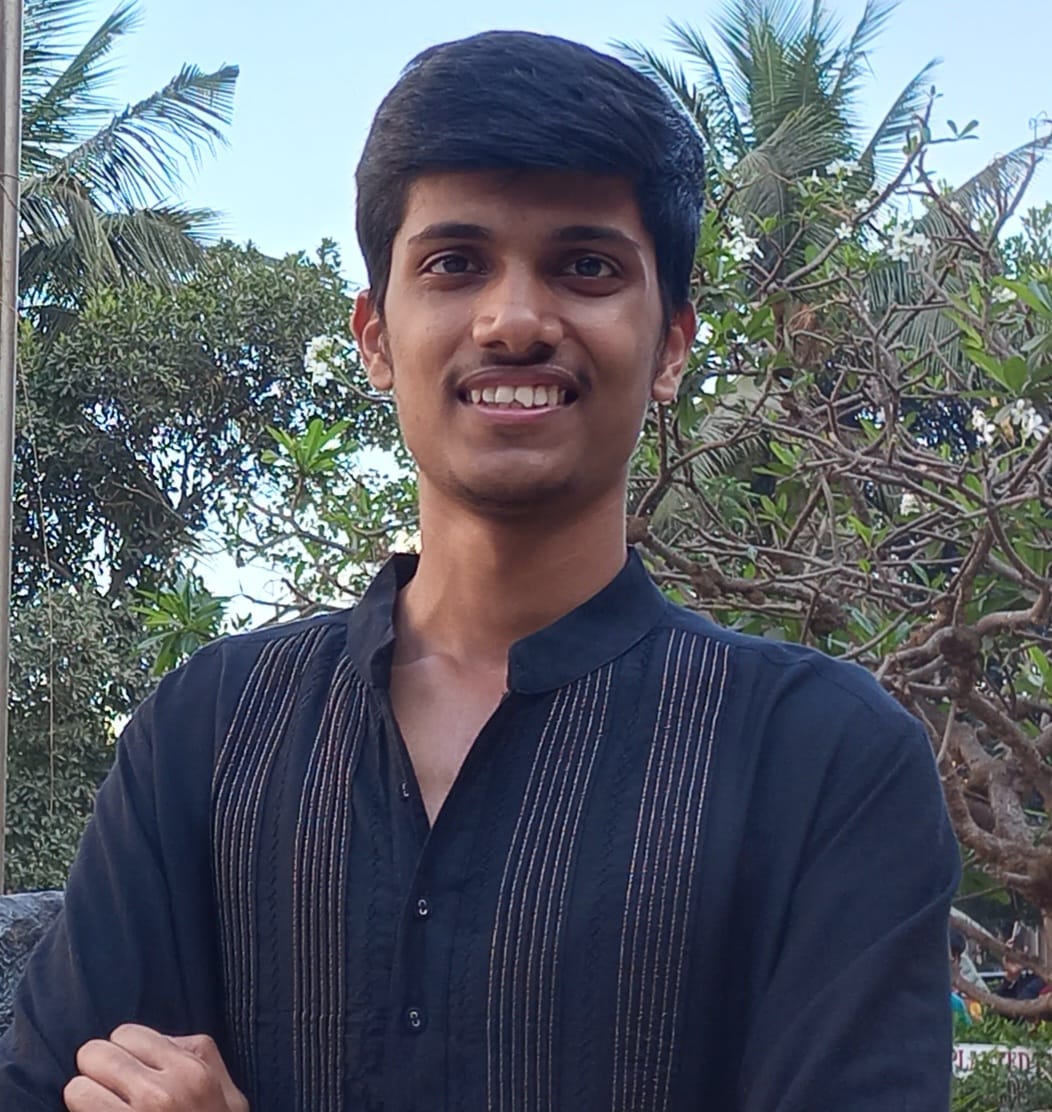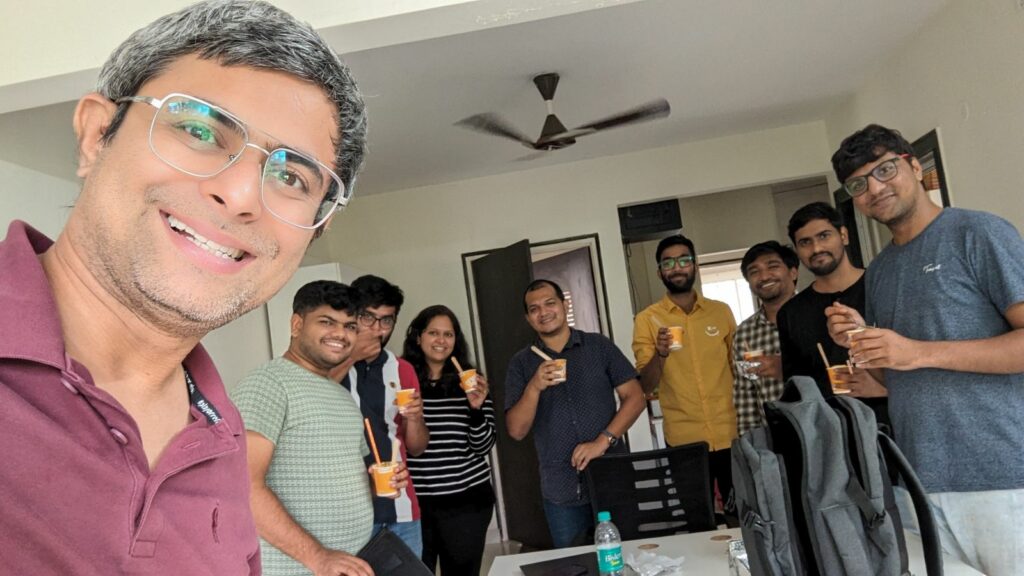Hi, July! Bye, July! 👋
New Joinees & Exits
We had 3 new joinees recently

Jagruti Sawant - HR Intern

Tejas Samant - Software Engineering Intern
Tejas, who lives in Mulund, Mumbai, has completed his BE from Vivekanand Education Society's Institute of Technology. Tejas loves watching football, trekking and travelling, AND is a certified foodie.
His friends and family describe Tejas as someone who is jolly, patient, proactive, and humble. And someone who is easy to be friends with.
Fun facts about Tejas: He was a Hindi Subject Topper in his 10th board
exam and was a Unified Cyber Olympiad Topper in school.

Aditya Rao - Software Engineering Intern
Exits
Pune is a Hotspot for Meetups!

Since Covid, we’ve been operating remotely and most teammates have adjusted to this style of work. It’s convenient, it allows us to hire from all across the country (or abroad :D) and hey! you can work in your pyjamas. However, we also do miss office sometimes and hence we can’t seem to part with our Pune office! 😀
Wisdm started an office in Pune back in 2016, and while it’s moved addresses, the office is dear to us because it serves as a meetup location when people want to work together, or during training and recruitment activities.
This month, we saw a mini meetup when Rohan was working from the Pune office. We also had Dhanashree (HR executive – who was working with us as an employee in the Pune office, and now works as a consultant from Germany) visit.
Others who could join, and are seen enjoying mango mastani in the pic, are Yogesh Deore, Kumar Rajpurohit, Flloyde D’Mello, Yash Vardhan, Alpesh Patil, Abhay V, and Jaydeep Trivedi.
The Magical Decision Wand 🪄
Malti was decisionphobic.
While at work or otherwise – decisions made her anxious. What should I wear today? Should I eat rice or roti for lunch? Do I have to reply to this email now? Should I tell my boss the project is delayed? She overthought every single decision – big or small.
Her reasons, in her mind, were clear:
- She wanted to fit in
- She didn’t want people to think she was rude or incompetent
- She didn’t want to be judged by her peers for a poor decision
- She didn’t want to be yelled at by her boss
Basically, she wanted to make good decisions – but she did not know what “good decisions” were.
On the opposite side of the spectrum was Swati. Swati was comfortable making decisions and Malti could see it. Most people in their office could. While Malti stood by the plate of snacks wondering if she should eat the last remaining samosa, Swati engaged in a conversation with a colleague, picked it up and walked away, without noticing Malti.
Malti wanted to be as confident as Swati. Why wasn’t she? What did Swati have that she didn’t?
One day, Malti reached office early and noticed a short black stick fallen on the floor. It appeared to be glowing. Malti rubbed her eyes to confirm if her sleepy brain was trying to play tricks on her. It wasn’t. There was a wand on the floor. Malti picked up the wand/stick.
I’M A MAGICAL DECISION WAND – I make decisions easy.
These words were inscribed on it.
Matli recalled this one time when she had noticed something similar in Swati’s bag. Her bag had appeared to be glowing then too. And when Malti had asked Swati about it, Swati had laughed it off. Or had she tried to hide the wand? Had Malti even asked her about it? She couldn’t exactly recall. But she knew it was Swati’s. She added 2 + 2. Swati easily makes decisions because she has this wand! 💡
Malti was elated. Grinning ear to ear. She had something she always wanted. A magical wand to help her make quick decisions.
Powered by the wand, Malti became more confident. She trusted that the wand worked with her gut to guide her on better decision making. She no longer procrastinated, or delayed her communication or got anxious. When faced with a decision, she went with the one she thought was right with the little wisdom she had picked up over the years. Because surely, the wand was working its magic.
But wait, hold on. What about Swati?
She noticed Swati acted quite normal. Why wasn’t she worried about the loss of her wand? Nothing had changed in Swati’s world. Where was the worry on her face? The dark circles due to sleepless nights searching for the wand? Malti confronted Swati.
Anticlimax (or maybe an expected climax)
Swati was puzzled. What wand? She thought for a moment before realising it was a prop in the many lectures she gave. You see, not only was Swati a confident decision maker, she spoke about taking decisions too, and helped people like Malti.
She said there is no magic wand when it comes to making good or right decisions. Because the fact is,
- there are no good or bad decisions. There are decisions and outcomes.
- we have to make a decision and be ready to deal with the outcome.
- what can help us is to regulate our emotions – find out what we’re afraid of – visualise the worst possible outcome, and create a counter or backup plan
- we need to get comfortable with making imperfect decisions and have a look forward attitude
- we also need to always be willing to learn from our decisions instead of regretting poor outcomes
Malti felt like the wand had crept out of her bag and hit her on the head. Luckily Swati wasn’t laughing at her for believing that a magic wand existed. Instead Swati was empathetic and understood her predicament. When Malti heard whatever Swati had to tell her, she realised that all this time trusting the magic wand, she kept her emotions in control and was okay with making decisions and dealing with the consequences. But there was no magic here. It was all Malti’s doing. So far, nothing bad had happened that Malti couldn’t deal with. However, being true to her self-doubting self, a slight wave of unsurety passed through Malti’s mind.
Is there a way to minimize the risk in any decision making process? Malti asked. Sure, said Swati.
Rules help, and so can guidelines. For example, at work we have policies. And if we dig deeper, we have a value code too. Values help us make decisions, said Swati.
Now, Malti was a bit worried, all these years of conditioning weren’t easy to overcome with no magic wand. However, she decided to give it a try. She stopped fretting over small decisions and reduced the emotional volatility when making them. She relied on something concrete like company policies and values to make pragmatic decisions. And she had a growth mindset to keep learning during setbacks.
We all have some shreds of Malti in us. Time to break that good decision mental barrier in our heads, and turn to known things like values to make the best decision in any given scenario.